Safeguarding and Anti-Bullying
Safeguarding at St.Helen's
Our greatest priority as a school is to always ensure the safety, well-being and happiness of all our children.
Throughout the year we are contactable at all times via the school email: sthelensprimary@sgmail.org.uk South Gloucestershire Council’s Safeguarding Access and Response Team (ART) is also available to report concerns about a child: 01454 866000 Monday to Thursday 9.00am – 5.00pm (4.30pm on Friday) and 01454 615165 out of hours and at weekends.
St Helen’s Primary School recognises its responsibilities for safeguarding children and protecting them from harm.
Designated Senior Person for Child Protection: Mr K Chappell
Designated Deputy Person for Child Protection: Mr J Leeming Mrs J Simpson
Designated Governor for Child Protection: Mr R Harris
You can find our safeguarding policy here by clicking the link below: Please note this is the model policy from the local authority.
Child Protection Safeguarding Policy 2024-25
It is important to know that as always, we are here to help as much as we possibly can. As a school we pride ourselves on our relationship with all of our families. We very much have an 'open door' policy and staff members are always on hand to support with any concerns. Please be aware that we are here at any time to listen to any worries or concerns and to help support you in the best way possible.This may be through support we can give your child directly in school or by signposting you to external services that we can access, for example the services of the school nursing team. If you need anything please do not hesitate to ask and make contact with school.
Following Anti-Bullying work in November and our NSPCC work, we wanted to see how the impact of this work. Please see below the results of our Safeguarding parent / carer survey.
Over 94 % of parent / carers said that their children has not been bullied at St.Helen's. For those that felt there was an issue, issues were resolved very quickly. Click on the link below to find out more.
Parent Carer Responses Anti Bullying January 2025
In the last parent / carer survey 2024 - well over 90% of respondents said that their children were happy.
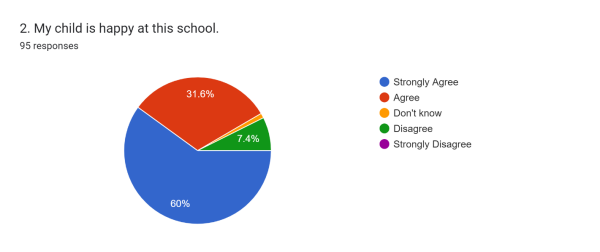
My Child is happy results: 91.6 felt their child was very happy.
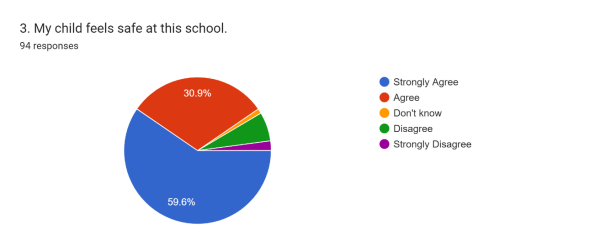
My child feels safe
Please see below a link to our school anti-bullying policy
The South Glos Safeguarding Page can be accessed by clicking the link below:
As discussed in the newsletter please find below a number of link to recommended advice lines to aid our mental and physical health.
These links have been provided by South Glos Specialist Health Improvement Practitioners and CYP Mental Health and Emotional Wellbeing team.
For adults support: https://oneyou.southglos.gov.uk/stress-less/
Alternatively, if you would like to speak to someone to find out what support is available, call 0333 577 4666 available from 11am-7pm Monday to Friday, 12pm-6pm Saturday and Sunday or email: communitysupport@southernbrooks.org.uk
https://oneyou.southglos.gov.uk/coronavirus-covid-19-useful-mental-health-information/
https://sites.southglos.gov.uk/mind-you/coronavirus-covid-19-useful-information/
The School Health Nursing Team also have a number of great links to consider during this time. Please click the link below to access the Children’s Community Health Partnership.
https://cchp.nhs.uk/cchp/explore-cchp/school-health-nursing
Compass Support
A new point of contact called Compass has been established to help families, agencies and settings navigate to the right information or support. Compass will provide advice, support, and guidance to help families and workers navigate to the right place and where to access appropriate early help.
Compass will include dedicated Compass Partnership Workers from the council.
The school has it's own Compass link worker who supports Mr Chappell in signpost the right support that is needed.
For access to the NSPCC website:
Please see below further links to well-being and mental health sites that you may find useful.
Supporting children with anxiety
Jigsaw Thornbury are running some online sessions for parents to provide some guidance and advice on supporting a child who experiences anxiety. This will consist of 3 sessions which will be an hour and a half each and will include some resources. Our school cluster has secured some places for free, so please email the school office if you’d be interested and we can send you some more information.
Other wellbeing events
Jigsaw Thornbury also offer regular wellbeing event, which can be found here: https://www.jigsawthornbury.org.uk/events/
As always, please do get in touch if we can provide any other support to you or your children.
South Gloucestershire Council’s own Safeguarding ART (Access and Response Team) is also available to report concerns about a child: 01454 866000 Monday to Thursday 9.00 am – 5.00 pm, 4.30 on Friday and 01454 615165 out of hours and at weekends.
The local authority designated safeguarding officer (LADO) is Jon Goddard.
Our ethos is that the effective safeguarding of children can only be achieved by putting children at the centre of a system where we listen and hear what they say. Every individual within our school will play their part, including working with professionals from other agencies, to meet the needs of our most vulnerable children and keep them safe.
Our school therefore, led by senior members of staff aims to provide a safe environment and vigilant culture where children and young people can learn and be safeguarded. If there are safeguarding concerns we will respond with appropriate action in a timely manner for those children who may need help or be suffering, or likely to suffer, significant harm.
E safety support:
Please click on the links below to access more support around helping children to stay safe online.
Where staff or others need to raise concerns, these can be to the Headteacher/Designated Person for safeguarding who will coordinate a response. Concerns can be raised directly with Children’s Social Care but we would advocate contact with the Headteacher/Designated Person first.
The designated safeguarding lead or Headteacher who is familiar with national and local guidance will share concerns, where appropriate, with the relevant agencies.
We run an annual briefing for volunteers, with some guidance around keeping children safe at St Helen’s. You can find the presentation below.
Safeguarding and Health and Safety at St Helen's 2024
Safeguarding- Anti-Bullying at St.Helen's
Our greatest priority as a school is to always ensure the safety, well-being and happiness of all our children.
Throughout the year we are contactable at all times via the school email: sthelensprimary@sgmail.org.uk South Gloucestershire Council’s Safeguarding Access and Response Team (ART) is also available to report concerns about a child: 01454 866000 Monday to Thursday 9.00am – 5.00pm (4.30pm on Friday) and 01454 615165 out of hours and at weekends.
St Helen’s Primary School recognises its responsibilities for safeguarding children and protecting them from harm.
One way we try to ensure that all our children aspire to our vision of:
'Excellence, Enjoyment and achievement together in a nurturing Christian Community’ ‘They will soar on wings like Eagles – Isaiah 40:31’
is to ensure that we try to make school a safe, secure and enjoyable environment.
We are very proud of the relationships that our children have with staff and their peers and behaviour to each other is generally good. This is something that has been noted in Head's Peer review days and our own Parent/ Carer survey.
Anti-Bullying is very important to us, ensuring that all children feel that they are safe in school.
Parent / Carer Survey 2024
Well over 90% of respondents said that their children had not been involved in any bullying issues. This is very high number is something that we are very proud about, but we would like to see that this is as close as possible to 100% in 2025. We are doing a lot of work with children constantly around what is the difference between a falling out with friends and what is bullying?
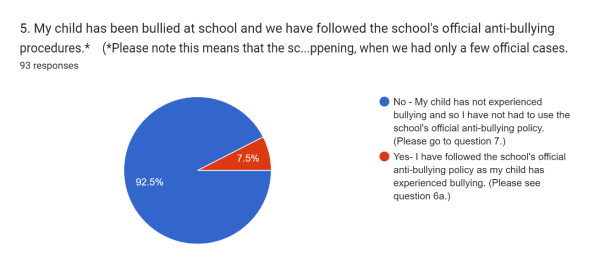
My Child has been bullied responses: 92.5% of parent/ carers felt that their child had not experienced bullying.
In the 2023 Local authority Online Pupil Survey: (Year 4,5,6) completed it. Over 80% of the children themselves highlighted that they had not experienced bullying. (This compares to average of 72% in the local authority.)
Note: We send a lot of communication out to all our parent/ carers about anti-bullying strategies and the policy: The following information has been conveyed in recent newsletters and on class dojo.
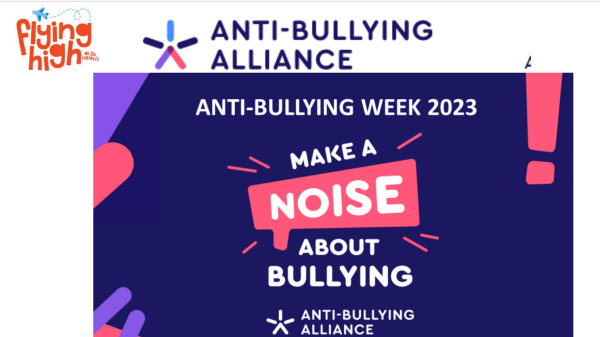
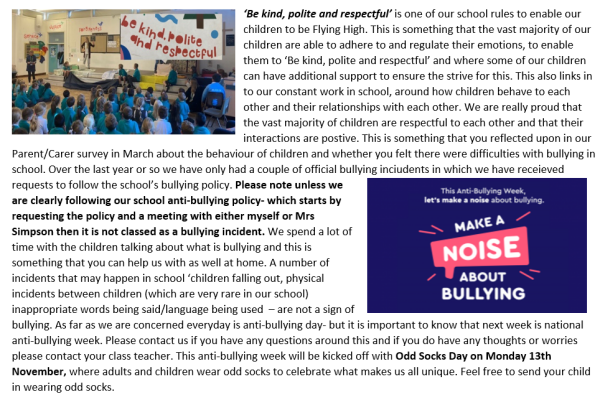
Term 2 Week 3
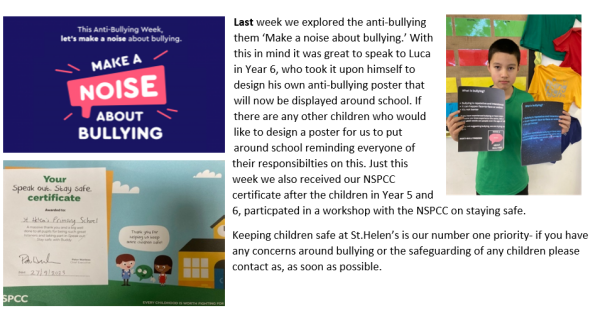

Click on the link to see our whole school assembly on anti-bullying.
"Everyday, Every week, should be anti-bullying at St.Helen's."
Respect Week 3 Anti Bullying assembly
Please see below what our parent/ carer's think about safety and bullying in school:
Parent/ Carer Survey 2023
The majority of parent / carers said they have not needed to contact us about any bullying incidents- which we are very pleased about. 14 respondents have said that they have contacted us around issues with the majority saying they feel things have been resolved - although we have in the last 18 months dealt with three official concerns around bullying so feel that there is a lot of work to do in terms of ensuring we, as parents, children and school ae consistent in our references to bullying.
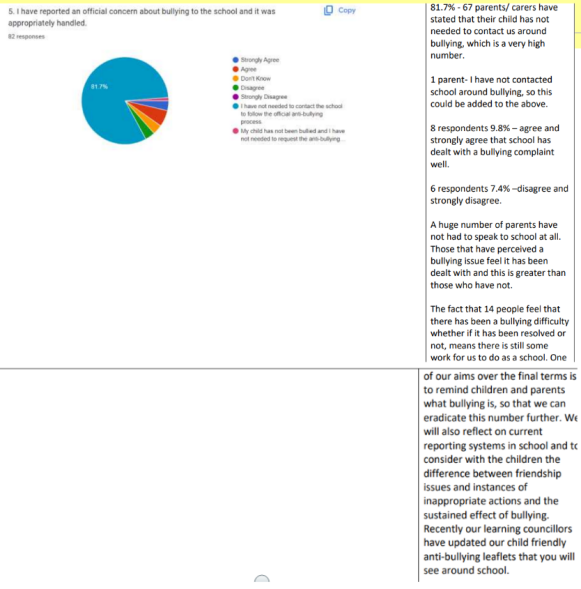
Online Safety
Internet Safety is something that children learn about at school through our Computing curriculum, our PSHE curriculum and through events like ‘Safer Internet Day’.
We have put this webpage together to give children, parents and carers lots of links and information to help keep children safe online.
Reporting internet safety concerns or abuse
Anyone can use the button below to get advice, help or make a report about abuse or anything online that they have concerns about.
Information for parents and carers
Downloadable leaflets and an excellent ‘Family Agreement’ can be found on the Childnet website.
Useful sites for advice and latest information
Internet Matters is a not-for-profit organisation working with online safety experts to bring you all the information you need to keep your children safe online.
Find the latest information on the sites you like to visit, mobiles and new technology. Find out what’s good, what’s not and what you can do about it. There’s also a place which anyone can use to report if they feel uncomfortable or worried about someone they are chatting to online. By the team at the NCA’s CEOP Command.
Childnet International is a non-profit organisation working with others to help make the internet a great and safe place for children.
The UK Safer Internet Centre has e-safety tips, advice and resources to help children and young people stay safe on the internet.
ChildLine is a private and confidential service for children and young people up to the age of 19. You can contact a ChildLine counsellor about anything – no problem is too big or too small.
NSPCC – Helpful advice and tools you can use to help keep your child safe whenever and wherever they go online. Every childhood is worth fighting for.
The Parent Zone help families deal with the many difficulties that are thrown up by the pace of technological change, providing them with the knowledge to make the most of the digital age, creatively and confidently.
Parent Info provides high quality information to parents and carers about their children’s wellbeing and resilience.
CBeebies Grown Ups - Toddlers and Tablets
Learn techniques to ensure your toddler gets off to the right start with tablets.
Learn how to stay safe online the fun way with Hacker and Dodge, the Dixi crew, Bobby Lockwood, the Horrible Histories gang and more!
Uk Safer Internet – Parents Guide to Technology
A guide to some of the most popular devices, highlighting the safety tools available and empowering parents with the knowledge they need to support their children to use these technologies safely and responsibly.
Useful Apps
NetAware from NSPCC
Cybersense from Internet Matters
Digital Parenting Magazine
For more information see: Vodaphone Digital Parenting Magazine website
Prevent Strategy
The government has published guidance for authorities, including schools, on their responsibilities under the Counter-Terrorism and Security Act, which came into effect on 1 July 2015.
Under the Act, schools and other authorities have a duty to “have due regard to the need to prevent people from being drawn into terrorism”.
What is the Prevent strategy?
Prevent is a government strategy designed to stop people becoming terrorists or supporting terrorist or extremist causes.
The Prevent strategy covers all types of terrorism and extremism, including the extreme right wing, violent Islamist groups and other causes.
How does the Prevent strategy apply to schools?
From July 2015 all schools (as well as other organisations) have a duty to safeguard children from radicalisation and extremism.
This means we have a responsibility to protect children from extremist and violent views the same way we protect them from other dangers.
Importantly, we can provide a safe place for pupils to discuss these issues so they better understand how to protect themselves.
What does this mean in practice?
Many of the things we already do in school to help children become positive, happy members of society also contribute to the Prevent strategy.
These include:
- Exploring other cultures and religions and promoting diversity
- Challenging prejudices and racist comments
- Developing critical thinking skills and a strong, positive self-identity
- Promoting the spiritual, moral, social and cultural development of pupils, as well as British values such as democracy
We will also protect children from the risk of radicalisation, for example by using filters on the internet to make sure they can’t access extremist and terrorist material, or by vetting visitors who come into school to work with pupils.
Different schools will carry out the Prevent duty in different ways, depending on the age of the children and the needs of the community.
Frequently Asked Questions
How does Prevent relate to British values?
Schools have been required to promote British values since 2014, and this will continue to be part of our response to the Prevent strategy.
British values include:
- Democracy
- The rule of law
- Individual liberty and mutual respect
- Tolerance of different faiths and beliefs
Isn’t my child too young to learn about extremism?
The Prevent strategy is not just about discussing extremism itself, which may not be appropriate for younger children. It is also about teaching children values such as tolerance and mutual respect.
The school will make sure any discussions are suitable for the age and maturity of the children involved.
Is extremism really a risk in our area?
Extremism can take many forms, including political, religious and misogynistic extremism. Some of these may be a bigger threat in our area than others.
We will give children the skills to protect them from any extremist views they may encounter, now or later in their lives.
KEY TERMS
Extremism – vocal or active opposition to fundamental British values such as democracy, the rule of law and tolerance of different faiths and beliefs
Ideology – a set of beliefs
Terrorism – a violent action against people or property, designed to create fear and advance a political, religious or ideological cause
Radicalisation – the process by which a person comes to support extremism and terrorism
Where to go for more information
Contact the school
If you have any questions or concerns about the Prevent strategy and what it means for your child, please do not hesitate to contact the school.
External sources
The following sources may also be useful for further information:
Prevent duty guidance: for England and Wales, HM Government
www.homeoffice.gov.uk
Frequently asked questions, Prevent For Schools
http://www.preventforschools.org/?category_id=38
What is Prevent? Let’s Talk About It
http://www.ltai.info/what-is-prevent/
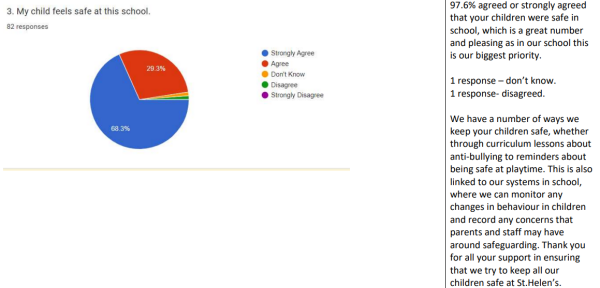
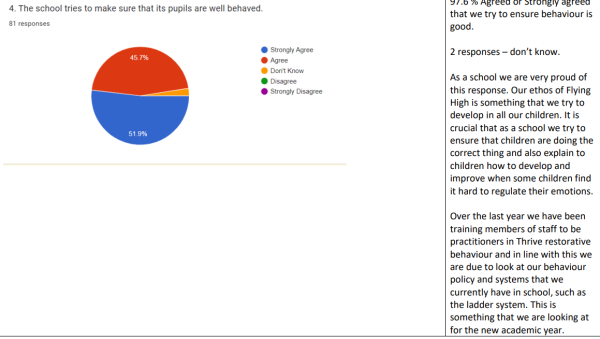
 Further results from the parent's survey show that the vast majority of our children are happy in school.
Further results from the parent's survey show that the vast majority of our children are happy in school.


